Leadership and Management Roles at Uber: A Detailed Analysis
VerifiedAdded on 2020/12/29
|12
|3877
|103
Report
AI Summary
This report provides a comprehensive analysis of leadership and management roles within Uber, examining the distinct characteristics and responsibilities of leaders and managers. It explores their functions in various situational contexts, including conflict management, employee engagement, and project management. The report delves into different leadership theories and models, such as contingency theory, situational leadership theory, and systems leadership theory, highlighting their strengths and weaknesses in the context of Uber's operations. Furthermore, it identifies key approaches to operations management, like the Just-in-time approach, and discusses the importance of operations management in achieving business objectives. The report also addresses factors within the business environment that influence operational management and the decision-making processes of leaders and managers at Uber. Overall, the report offers valuable insights into the leadership and management strategies employed by Uber to achieve its business goals.
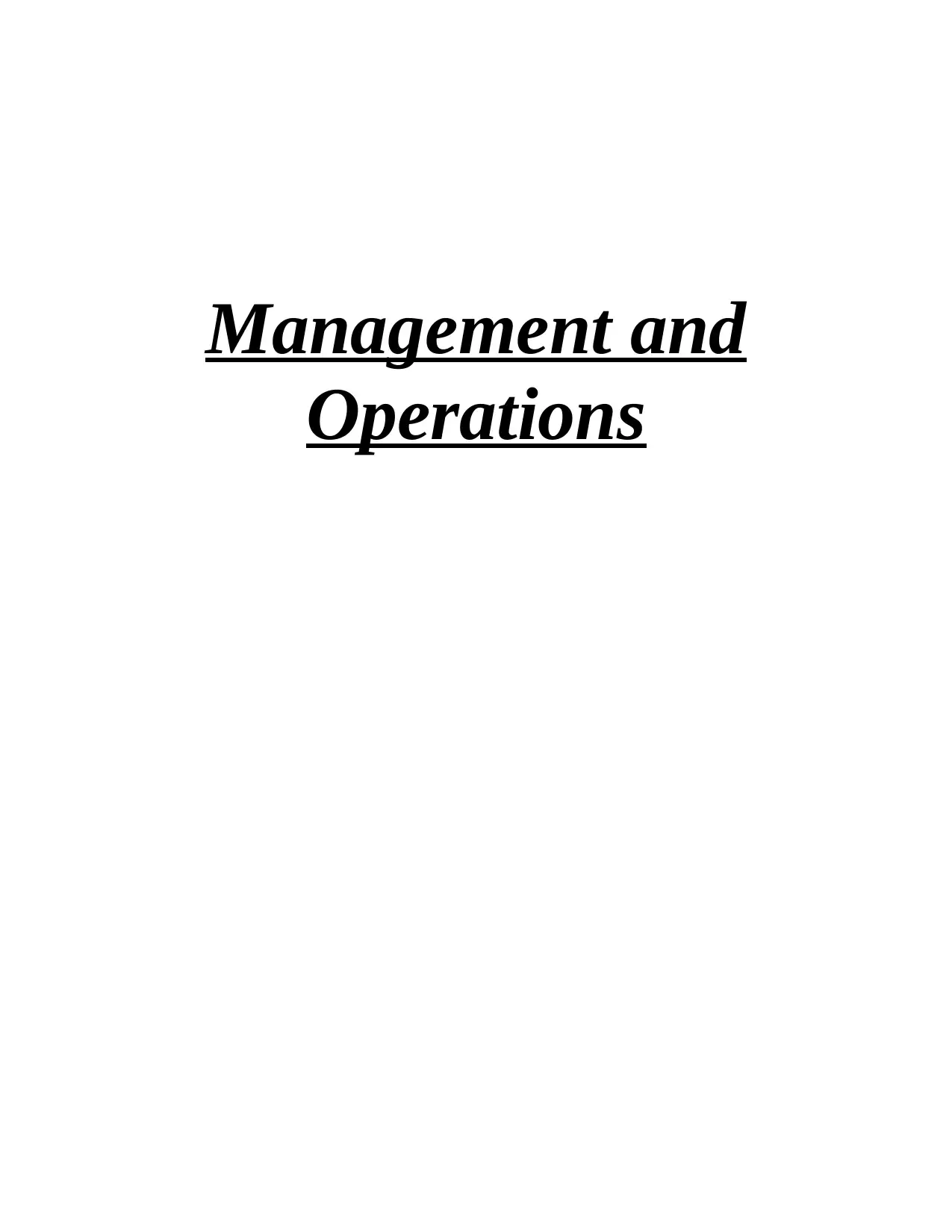
Management and
Operations
Operations
Paraphrase This Document
Need a fresh take? Get an instant paraphrase of this document with our AI Paraphraser
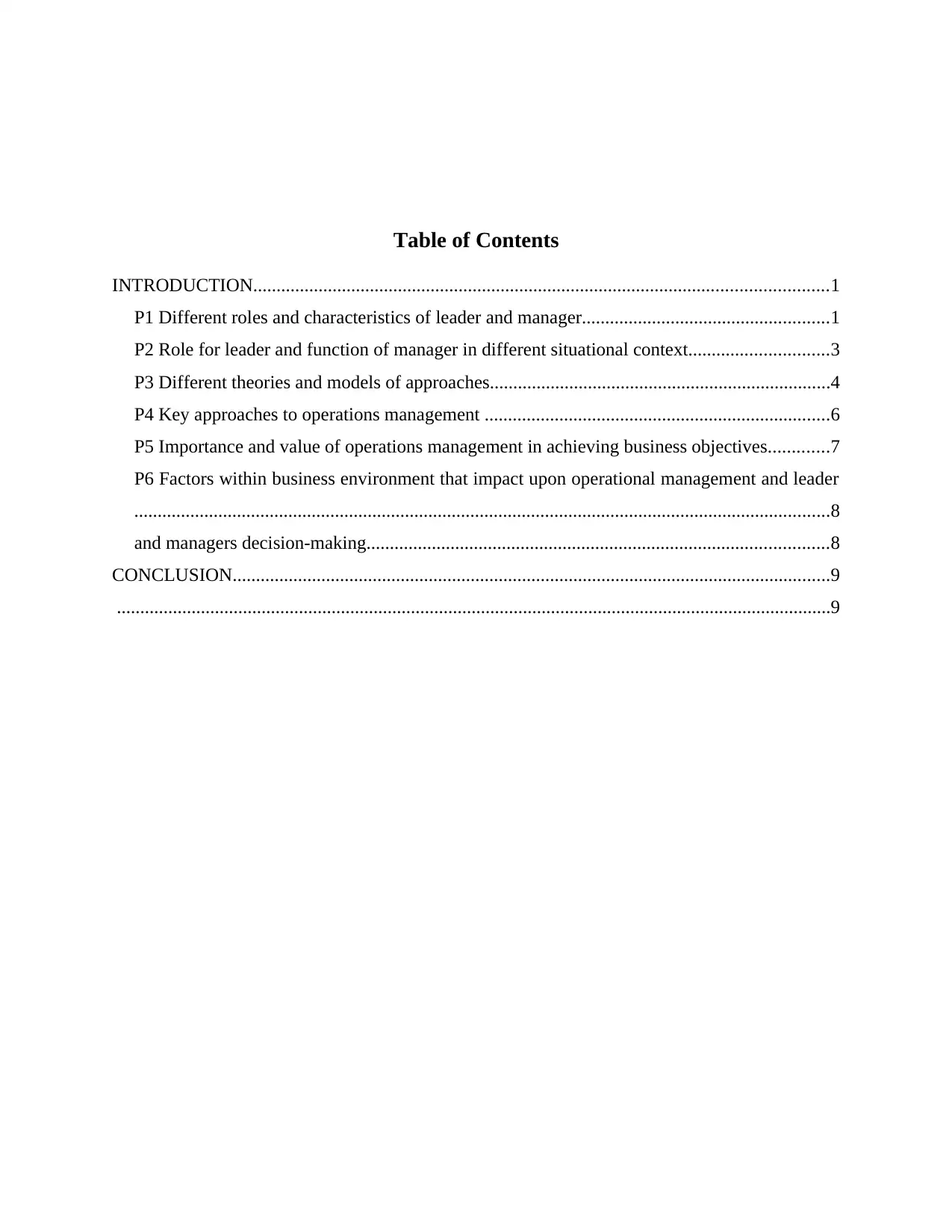
Table of Contents
INTRODUCTION...........................................................................................................................1
P1 Different roles and characteristics of leader and manager.....................................................1
P2 Role for leader and function of manager in different situational context..............................3
P3 Different theories and models of approaches.........................................................................4
P4 Key approaches to operations management ..........................................................................6
P5 Importance and value of operations management in achieving business objectives.............7
P6 Factors within business environment that impact upon operational management and leader
.....................................................................................................................................................8
and managers decision-making...................................................................................................8
CONCLUSION................................................................................................................................9
.........................................................................................................................................................9
INTRODUCTION...........................................................................................................................1
P1 Different roles and characteristics of leader and manager.....................................................1
P2 Role for leader and function of manager in different situational context..............................3
P3 Different theories and models of approaches.........................................................................4
P4 Key approaches to operations management ..........................................................................6
P5 Importance and value of operations management in achieving business objectives.............7
P6 Factors within business environment that impact upon operational management and leader
.....................................................................................................................................................8
and managers decision-making...................................................................................................8
CONCLUSION................................................................................................................................9
.........................................................................................................................................................9
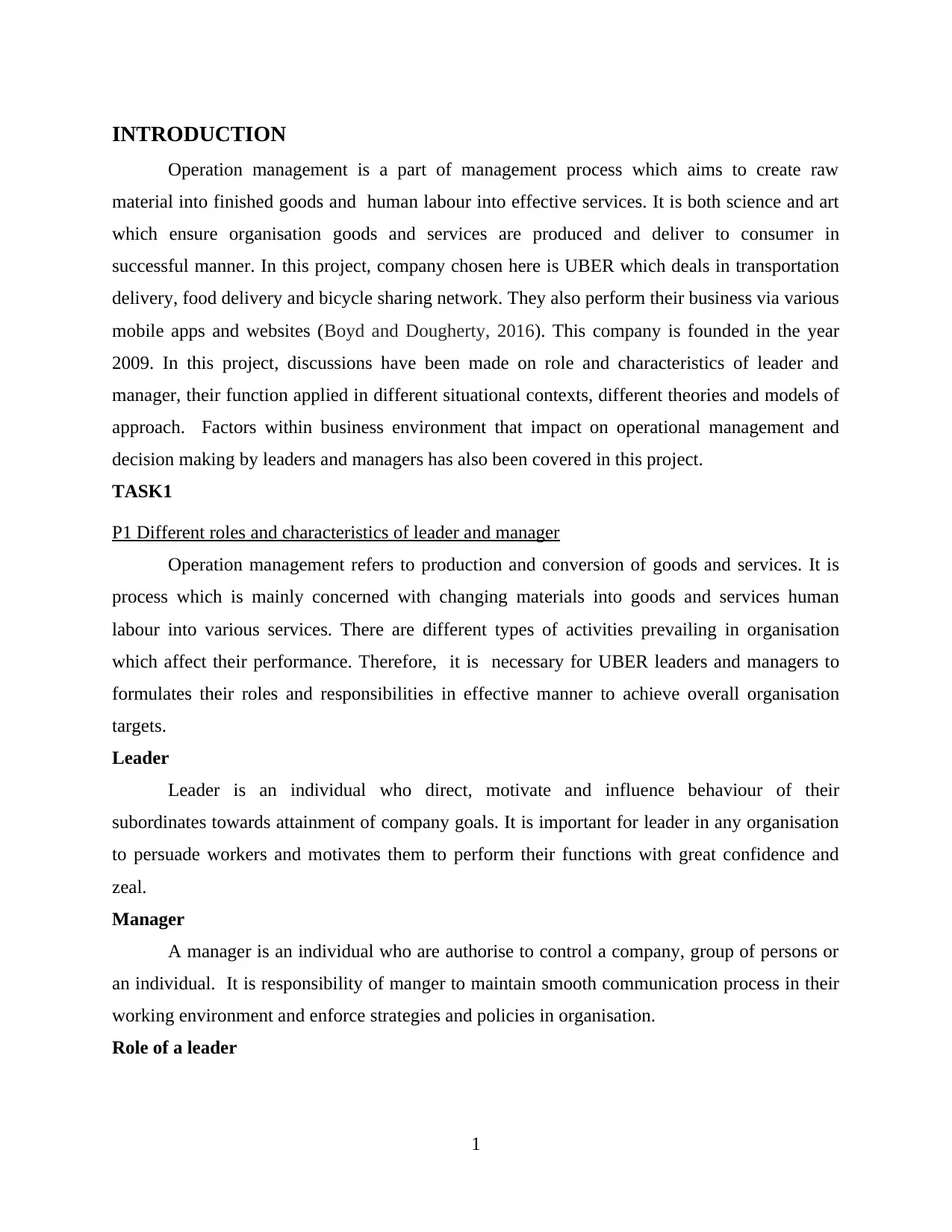
INTRODUCTION
Operation management is a part of management process which aims to create raw
material into finished goods and human labour into effective services. It is both science and art
which ensure organisation goods and services are produced and deliver to consumer in
successful manner. In this project, company chosen here is UBER which deals in transportation
delivery, food delivery and bicycle sharing network. They also perform their business via various
mobile apps and websites (Boyd and Dougherty, 2016). This company is founded in the year
2009. In this project, discussions have been made on role and characteristics of leader and
manager, their function applied in different situational contexts, different theories and models of
approach. Factors within business environment that impact on operational management and
decision making by leaders and managers has also been covered in this project.
TASK1
P1 Different roles and characteristics of leader and manager
Operation management refers to production and conversion of goods and services. It is
process which is mainly concerned with changing materials into goods and services human
labour into various services. There are different types of activities prevailing in organisation
which affect their performance. Therefore, it is necessary for UBER leaders and managers to
formulates their roles and responsibilities in effective manner to achieve overall organisation
targets.
Leader
Leader is an individual who direct, motivate and influence behaviour of their
subordinates towards attainment of company goals. It is important for leader in any organisation
to persuade workers and motivates them to perform their functions with great confidence and
zeal.
Manager
A manager is an individual who are authorise to control a company, group of persons or
an individual. It is responsibility of manger to maintain smooth communication process in their
working environment and enforce strategies and policies in organisation.
Role of a leader
1
Operation management is a part of management process which aims to create raw
material into finished goods and human labour into effective services. It is both science and art
which ensure organisation goods and services are produced and deliver to consumer in
successful manner. In this project, company chosen here is UBER which deals in transportation
delivery, food delivery and bicycle sharing network. They also perform their business via various
mobile apps and websites (Boyd and Dougherty, 2016). This company is founded in the year
2009. In this project, discussions have been made on role and characteristics of leader and
manager, their function applied in different situational contexts, different theories and models of
approach. Factors within business environment that impact on operational management and
decision making by leaders and managers has also been covered in this project.
TASK1
P1 Different roles and characteristics of leader and manager
Operation management refers to production and conversion of goods and services. It is
process which is mainly concerned with changing materials into goods and services human
labour into various services. There are different types of activities prevailing in organisation
which affect their performance. Therefore, it is necessary for UBER leaders and managers to
formulates their roles and responsibilities in effective manner to achieve overall organisation
targets.
Leader
Leader is an individual who direct, motivate and influence behaviour of their
subordinates towards attainment of company goals. It is important for leader in any organisation
to persuade workers and motivates them to perform their functions with great confidence and
zeal.
Manager
A manager is an individual who are authorise to control a company, group of persons or
an individual. It is responsibility of manger to maintain smooth communication process in their
working environment and enforce strategies and policies in organisation.
Role of a leader
1
⊘ This is a preview!⊘
Do you want full access?
Subscribe today to unlock all pages.

Trusted by 1+ million students worldwide
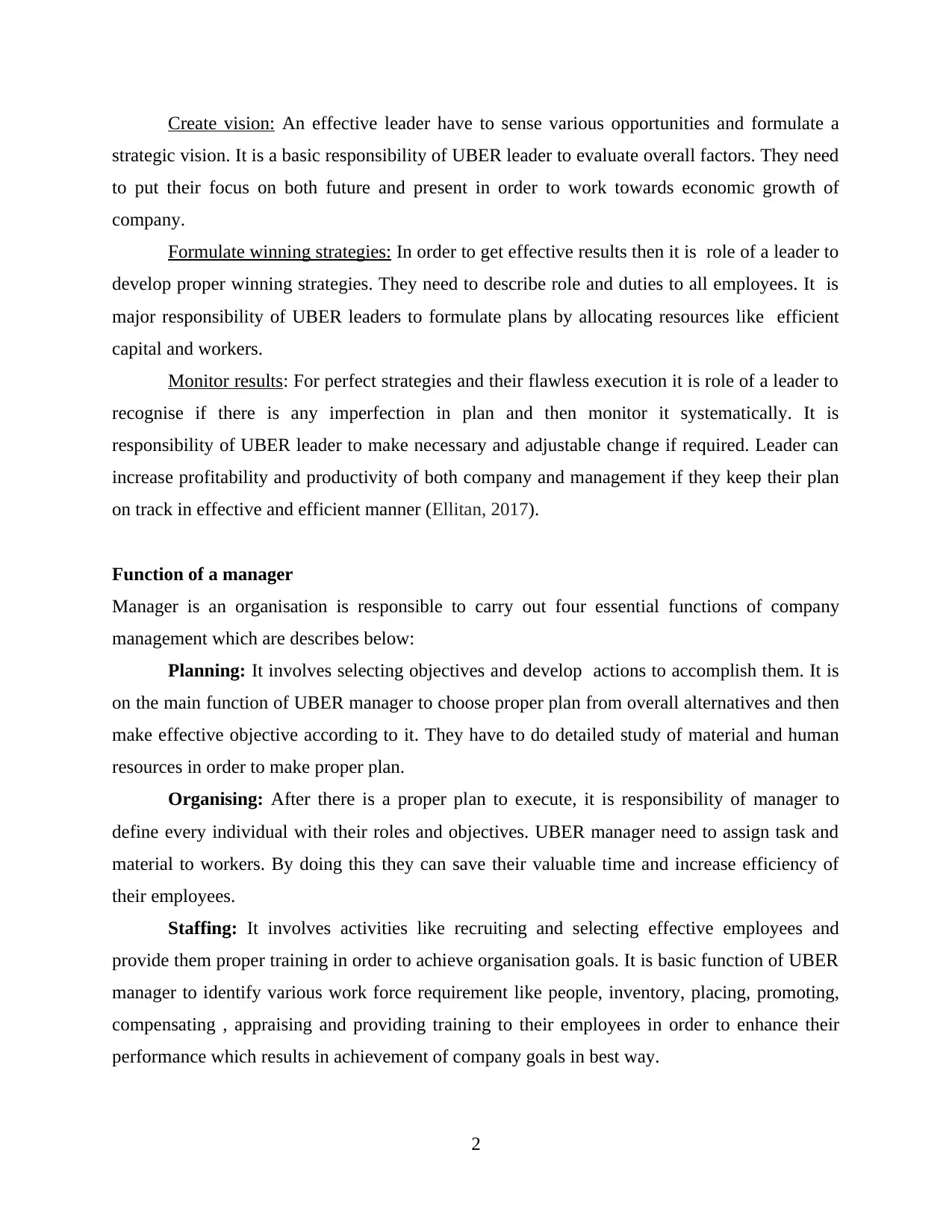
Create vision: An effective leader have to sense various opportunities and formulate a
strategic vision. It is a basic responsibility of UBER leader to evaluate overall factors. They need
to put their focus on both future and present in order to work towards economic growth of
company.
Formulate winning strategies: In order to get effective results then it is role of a leader to
develop proper winning strategies. They need to describe role and duties to all employees. It is
major responsibility of UBER leaders to formulate plans by allocating resources like efficient
capital and workers.
Monitor results: For perfect strategies and their flawless execution it is role of a leader to
recognise if there is any imperfection in plan and then monitor it systematically. It is
responsibility of UBER leader to make necessary and adjustable change if required. Leader can
increase profitability and productivity of both company and management if they keep their plan
on track in effective and efficient manner (Ellitan, 2017).
Function of a manager
Manager is an organisation is responsible to carry out four essential functions of company
management which are describes below:
Planning: It involves selecting objectives and develop actions to accomplish them. It is
on the main function of UBER manager to choose proper plan from overall alternatives and then
make effective objective according to it. They have to do detailed study of material and human
resources in order to make proper plan.
Organising: After there is a proper plan to execute, it is responsibility of manager to
define every individual with their roles and objectives. UBER manager need to assign task and
material to workers. By doing this they can save their valuable time and increase efficiency of
their employees.
Staffing: It involves activities like recruiting and selecting effective employees and
provide them proper training in order to achieve organisation goals. It is basic function of UBER
manager to identify various work force requirement like people, inventory, placing, promoting,
compensating , appraising and providing training to their employees in order to enhance their
performance which results in achievement of company goals in best way.
2
strategic vision. It is a basic responsibility of UBER leader to evaluate overall factors. They need
to put their focus on both future and present in order to work towards economic growth of
company.
Formulate winning strategies: In order to get effective results then it is role of a leader to
develop proper winning strategies. They need to describe role and duties to all employees. It is
major responsibility of UBER leaders to formulate plans by allocating resources like efficient
capital and workers.
Monitor results: For perfect strategies and their flawless execution it is role of a leader to
recognise if there is any imperfection in plan and then monitor it systematically. It is
responsibility of UBER leader to make necessary and adjustable change if required. Leader can
increase profitability and productivity of both company and management if they keep their plan
on track in effective and efficient manner (Ellitan, 2017).
Function of a manager
Manager is an organisation is responsible to carry out four essential functions of company
management which are describes below:
Planning: It involves selecting objectives and develop actions to accomplish them. It is
on the main function of UBER manager to choose proper plan from overall alternatives and then
make effective objective according to it. They have to do detailed study of material and human
resources in order to make proper plan.
Organising: After there is a proper plan to execute, it is responsibility of manager to
define every individual with their roles and objectives. UBER manager need to assign task and
material to workers. By doing this they can save their valuable time and increase efficiency of
their employees.
Staffing: It involves activities like recruiting and selecting effective employees and
provide them proper training in order to achieve organisation goals. It is basic function of UBER
manager to identify various work force requirement like people, inventory, placing, promoting,
compensating , appraising and providing training to their employees in order to enhance their
performance which results in achievement of company goals in best way.
2
Paraphrase This Document
Need a fresh take? Get an instant paraphrase of this document with our AI Paraphraser
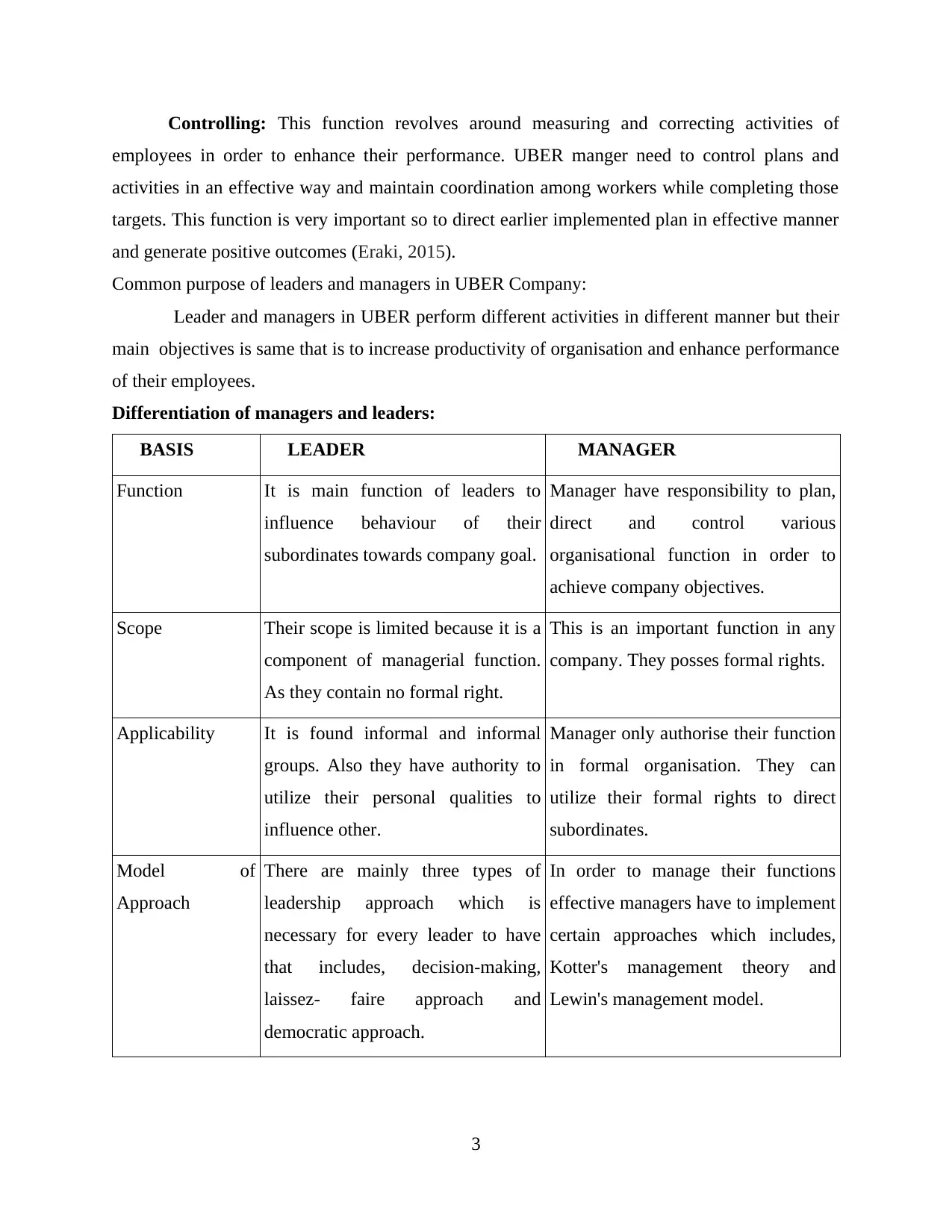
Controlling: This function revolves around measuring and correcting activities of
employees in order to enhance their performance. UBER manger need to control plans and
activities in an effective way and maintain coordination among workers while completing those
targets. This function is very important so to direct earlier implemented plan in effective manner
and generate positive outcomes (Eraki, 2015).
Common purpose of leaders and managers in UBER Company:
Leader and managers in UBER perform different activities in different manner but their
main objectives is same that is to increase productivity of organisation and enhance performance
of their employees.
Differentiation of managers and leaders:
BASIS LEADER MANAGER
Function It is main function of leaders to
influence behaviour of their
subordinates towards company goal.
Manager have responsibility to plan,
direct and control various
organisational function in order to
achieve company objectives.
Scope Their scope is limited because it is a
component of managerial function.
As they contain no formal right.
This is an important function in any
company. They posses formal rights.
Applicability It is found informal and informal
groups. Also they have authority to
utilize their personal qualities to
influence other.
Manager only authorise their function
in formal organisation. They can
utilize their formal rights to direct
subordinates.
Model of
Approach
There are mainly three types of
leadership approach which is
necessary for every leader to have
that includes, decision-making,
laissez- faire approach and
democratic approach.
In order to manage their functions
effective managers have to implement
certain approaches which includes,
Kotter's management theory and
Lewin's management model.
3
employees in order to enhance their performance. UBER manger need to control plans and
activities in an effective way and maintain coordination among workers while completing those
targets. This function is very important so to direct earlier implemented plan in effective manner
and generate positive outcomes (Eraki, 2015).
Common purpose of leaders and managers in UBER Company:
Leader and managers in UBER perform different activities in different manner but their
main objectives is same that is to increase productivity of organisation and enhance performance
of their employees.
Differentiation of managers and leaders:
BASIS LEADER MANAGER
Function It is main function of leaders to
influence behaviour of their
subordinates towards company goal.
Manager have responsibility to plan,
direct and control various
organisational function in order to
achieve company objectives.
Scope Their scope is limited because it is a
component of managerial function.
As they contain no formal right.
This is an important function in any
company. They posses formal rights.
Applicability It is found informal and informal
groups. Also they have authority to
utilize their personal qualities to
influence other.
Manager only authorise their function
in formal organisation. They can
utilize their formal rights to direct
subordinates.
Model of
Approach
There are mainly three types of
leadership approach which is
necessary for every leader to have
that includes, decision-making,
laissez- faire approach and
democratic approach.
In order to manage their functions
effective managers have to implement
certain approaches which includes,
Kotter's management theory and
Lewin's management model.
3
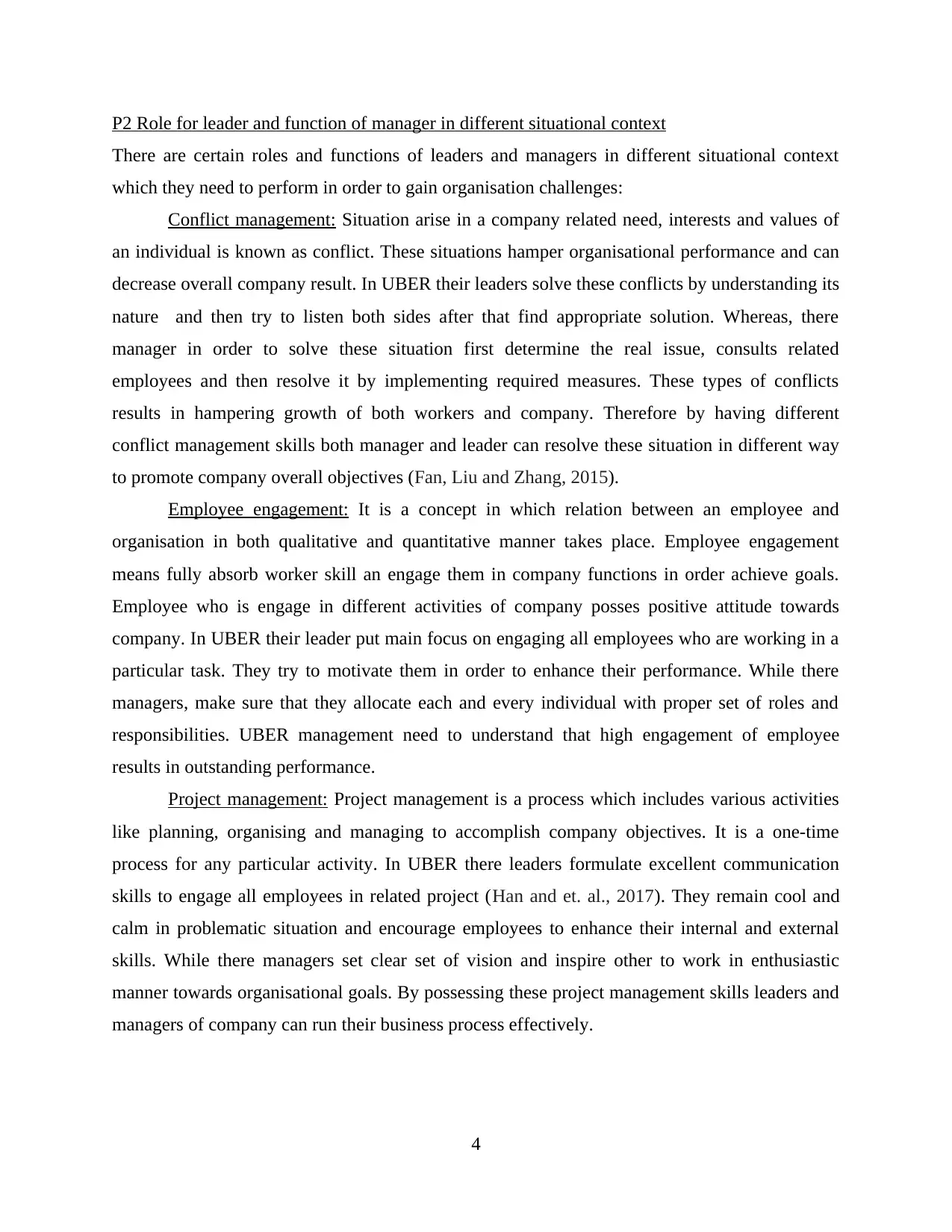
P2 Role for leader and function of manager in different situational context
There are certain roles and functions of leaders and managers in different situational context
which they need to perform in order to gain organisation challenges:
Conflict management: Situation arise in a company related need, interests and values of
an individual is known as conflict. These situations hamper organisational performance and can
decrease overall company result. In UBER their leaders solve these conflicts by understanding its
nature and then try to listen both sides after that find appropriate solution. Whereas, there
manager in order to solve these situation first determine the real issue, consults related
employees and then resolve it by implementing required measures. These types of conflicts
results in hampering growth of both workers and company. Therefore by having different
conflict management skills both manager and leader can resolve these situation in different way
to promote company overall objectives (Fan, Liu and Zhang, 2015).
Employee engagement: It is a concept in which relation between an employee and
organisation in both qualitative and quantitative manner takes place. Employee engagement
means fully absorb worker skill an engage them in company functions in order achieve goals.
Employee who is engage in different activities of company posses positive attitude towards
company. In UBER their leader put main focus on engaging all employees who are working in a
particular task. They try to motivate them in order to enhance their performance. While there
managers, make sure that they allocate each and every individual with proper set of roles and
responsibilities. UBER management need to understand that high engagement of employee
results in outstanding performance.
Project management: Project management is a process which includes various activities
like planning, organising and managing to accomplish company objectives. It is a one-time
process for any particular activity. In UBER there leaders formulate excellent communication
skills to engage all employees in related project (Han and et. al., 2017). They remain cool and
calm in problematic situation and encourage employees to enhance their internal and external
skills. While there managers set clear set of vision and inspire other to work in enthusiastic
manner towards organisational goals. By possessing these project management skills leaders and
managers of company can run their business process effectively.
4
There are certain roles and functions of leaders and managers in different situational context
which they need to perform in order to gain organisation challenges:
Conflict management: Situation arise in a company related need, interests and values of
an individual is known as conflict. These situations hamper organisational performance and can
decrease overall company result. In UBER their leaders solve these conflicts by understanding its
nature and then try to listen both sides after that find appropriate solution. Whereas, there
manager in order to solve these situation first determine the real issue, consults related
employees and then resolve it by implementing required measures. These types of conflicts
results in hampering growth of both workers and company. Therefore by having different
conflict management skills both manager and leader can resolve these situation in different way
to promote company overall objectives (Fan, Liu and Zhang, 2015).
Employee engagement: It is a concept in which relation between an employee and
organisation in both qualitative and quantitative manner takes place. Employee engagement
means fully absorb worker skill an engage them in company functions in order achieve goals.
Employee who is engage in different activities of company posses positive attitude towards
company. In UBER their leader put main focus on engaging all employees who are working in a
particular task. They try to motivate them in order to enhance their performance. While there
managers, make sure that they allocate each and every individual with proper set of roles and
responsibilities. UBER management need to understand that high engagement of employee
results in outstanding performance.
Project management: Project management is a process which includes various activities
like planning, organising and managing to accomplish company objectives. It is a one-time
process for any particular activity. In UBER there leaders formulate excellent communication
skills to engage all employees in related project (Han and et. al., 2017). They remain cool and
calm in problematic situation and encourage employees to enhance their internal and external
skills. While there managers set clear set of vision and inspire other to work in enthusiastic
manner towards organisational goals. By possessing these project management skills leaders and
managers of company can run their business process effectively.
4
⊘ This is a preview!⊘
Do you want full access?
Subscribe today to unlock all pages.

Trusted by 1+ million students worldwide
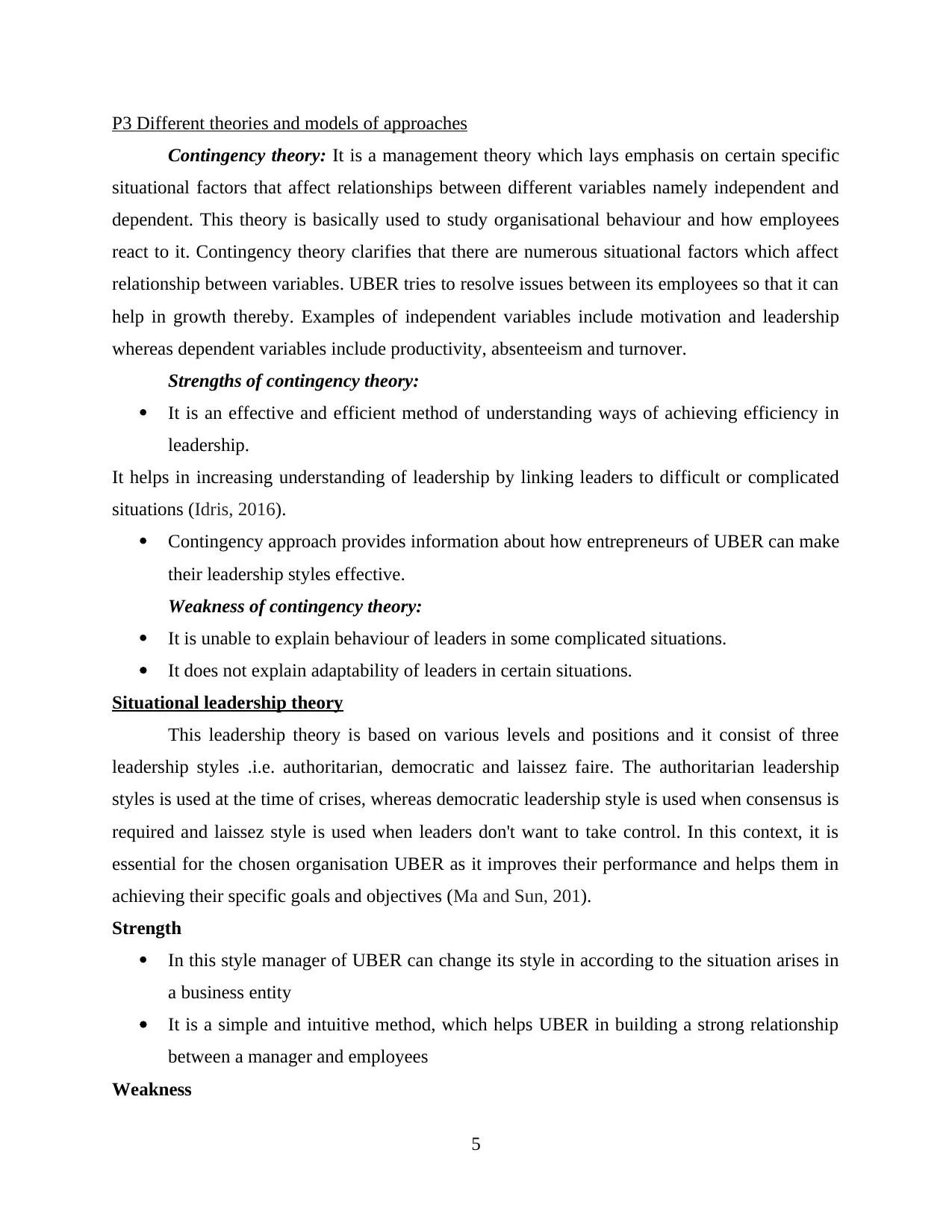
P3 Different theories and models of approaches
Contingency theory: It is a management theory which lays emphasis on certain specific
situational factors that affect relationships between different variables namely independent and
dependent. This theory is basically used to study organisational behaviour and how employees
react to it. Contingency theory clarifies that there are numerous situational factors which affect
relationship between variables. UBER tries to resolve issues between its employees so that it can
help in growth thereby. Examples of independent variables include motivation and leadership
whereas dependent variables include productivity, absenteeism and turnover.
Strengths of contingency theory:
It is an effective and efficient method of understanding ways of achieving efficiency in
leadership.
It helps in increasing understanding of leadership by linking leaders to difficult or complicated
situations (Idris, 2016).
Contingency approach provides information about how entrepreneurs of UBER can make
their leadership styles effective.
Weakness of contingency theory:
It is unable to explain behaviour of leaders in some complicated situations.
It does not explain adaptability of leaders in certain situations.
Situational leadership theory
This leadership theory is based on various levels and positions and it consist of three
leadership styles .i.e. authoritarian, democratic and laissez faire. The authoritarian leadership
styles is used at the time of crises, whereas democratic leadership style is used when consensus is
required and laissez style is used when leaders don't want to take control. In this context, it is
essential for the chosen organisation UBER as it improves their performance and helps them in
achieving their specific goals and objectives (Ma and Sun, 201).
Strength
In this style manager of UBER can change its style in according to the situation arises in
a business entity
It is a simple and intuitive method, which helps UBER in building a strong relationship
between a manager and employees
Weakness
5
Contingency theory: It is a management theory which lays emphasis on certain specific
situational factors that affect relationships between different variables namely independent and
dependent. This theory is basically used to study organisational behaviour and how employees
react to it. Contingency theory clarifies that there are numerous situational factors which affect
relationship between variables. UBER tries to resolve issues between its employees so that it can
help in growth thereby. Examples of independent variables include motivation and leadership
whereas dependent variables include productivity, absenteeism and turnover.
Strengths of contingency theory:
It is an effective and efficient method of understanding ways of achieving efficiency in
leadership.
It helps in increasing understanding of leadership by linking leaders to difficult or complicated
situations (Idris, 2016).
Contingency approach provides information about how entrepreneurs of UBER can make
their leadership styles effective.
Weakness of contingency theory:
It is unable to explain behaviour of leaders in some complicated situations.
It does not explain adaptability of leaders in certain situations.
Situational leadership theory
This leadership theory is based on various levels and positions and it consist of three
leadership styles .i.e. authoritarian, democratic and laissez faire. The authoritarian leadership
styles is used at the time of crises, whereas democratic leadership style is used when consensus is
required and laissez style is used when leaders don't want to take control. In this context, it is
essential for the chosen organisation UBER as it improves their performance and helps them in
achieving their specific goals and objectives (Ma and Sun, 201).
Strength
In this style manager of UBER can change its style in according to the situation arises in
a business entity
It is a simple and intuitive method, which helps UBER in building a strong relationship
between a manager and employees
Weakness
5
Paraphrase This Document
Need a fresh take? Get an instant paraphrase of this document with our AI Paraphraser
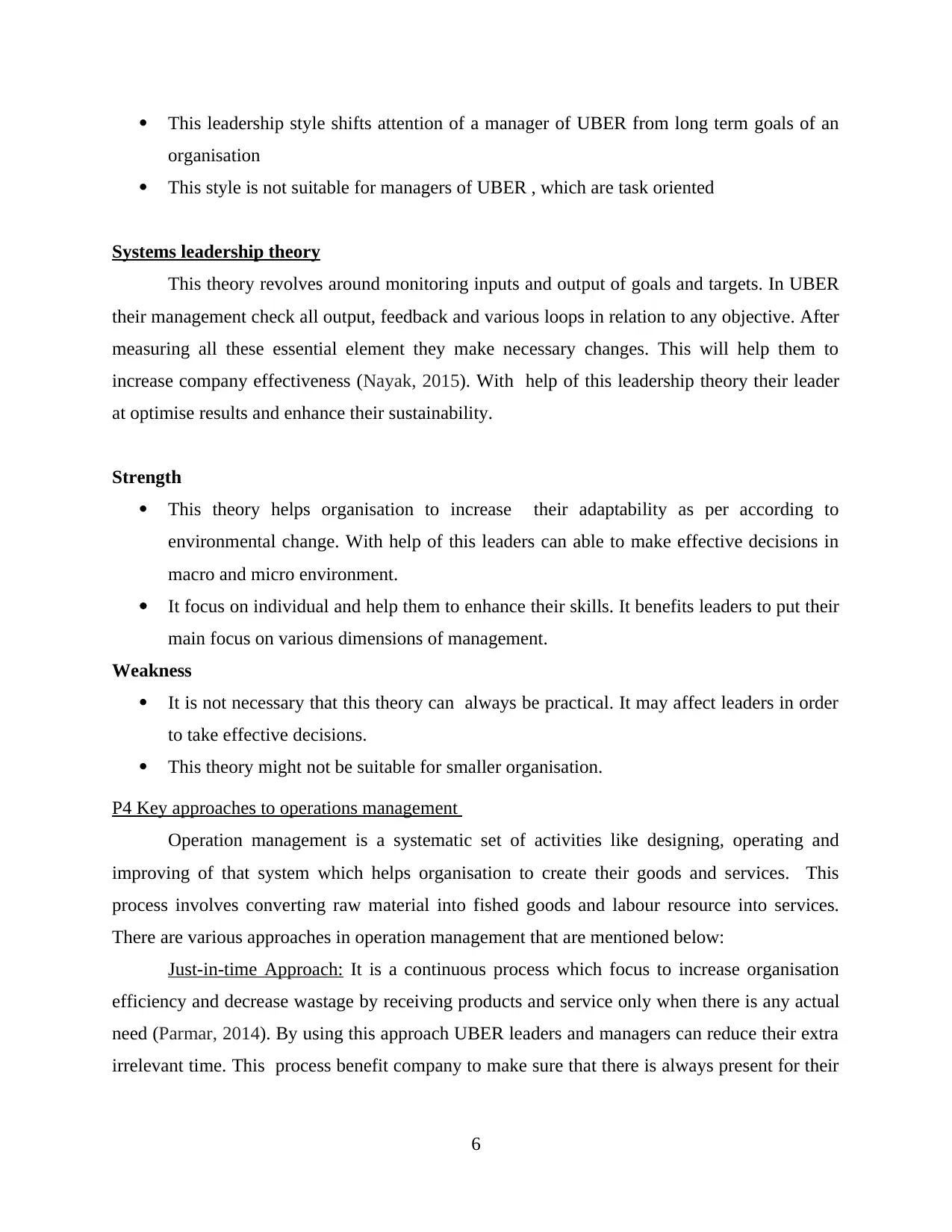
This leadership style shifts attention of a manager of UBER from long term goals of an
organisation
This style is not suitable for managers of UBER , which are task oriented
Systems leadership theory
This theory revolves around monitoring inputs and output of goals and targets. In UBER
their management check all output, feedback and various loops in relation to any objective. After
measuring all these essential element they make necessary changes. This will help them to
increase company effectiveness (Nayak, 2015). With help of this leadership theory their leader
at optimise results and enhance their sustainability.
Strength
This theory helps organisation to increase their adaptability as per according to
environmental change. With help of this leaders can able to make effective decisions in
macro and micro environment.
It focus on individual and help them to enhance their skills. It benefits leaders to put their
main focus on various dimensions of management.
Weakness
It is not necessary that this theory can always be practical. It may affect leaders in order
to take effective decisions.
This theory might not be suitable for smaller organisation.
P4 Key approaches to operations management
Operation management is a systematic set of activities like designing, operating and
improving of that system which helps organisation to create their goods and services. This
process involves converting raw material into fished goods and labour resource into services.
There are various approaches in operation management that are mentioned below:
Just-in-time Approach: It is a continuous process which focus to increase organisation
efficiency and decrease wastage by receiving products and service only when there is any actual
need (Parmar, 2014). By using this approach UBER leaders and managers can reduce their extra
irrelevant time. This process benefit company to make sure that there is always present for their
6
organisation
This style is not suitable for managers of UBER , which are task oriented
Systems leadership theory
This theory revolves around monitoring inputs and output of goals and targets. In UBER
their management check all output, feedback and various loops in relation to any objective. After
measuring all these essential element they make necessary changes. This will help them to
increase company effectiveness (Nayak, 2015). With help of this leadership theory their leader
at optimise results and enhance their sustainability.
Strength
This theory helps organisation to increase their adaptability as per according to
environmental change. With help of this leaders can able to make effective decisions in
macro and micro environment.
It focus on individual and help them to enhance their skills. It benefits leaders to put their
main focus on various dimensions of management.
Weakness
It is not necessary that this theory can always be practical. It may affect leaders in order
to take effective decisions.
This theory might not be suitable for smaller organisation.
P4 Key approaches to operations management
Operation management is a systematic set of activities like designing, operating and
improving of that system which helps organisation to create their goods and services. This
process involves converting raw material into fished goods and labour resource into services.
There are various approaches in operation management that are mentioned below:
Just-in-time Approach: It is a continuous process which focus to increase organisation
efficiency and decrease wastage by receiving products and service only when there is any actual
need (Parmar, 2014). By using this approach UBER leaders and managers can reduce their extra
irrelevant time. This process benefit company to make sure that there is always present for their
6
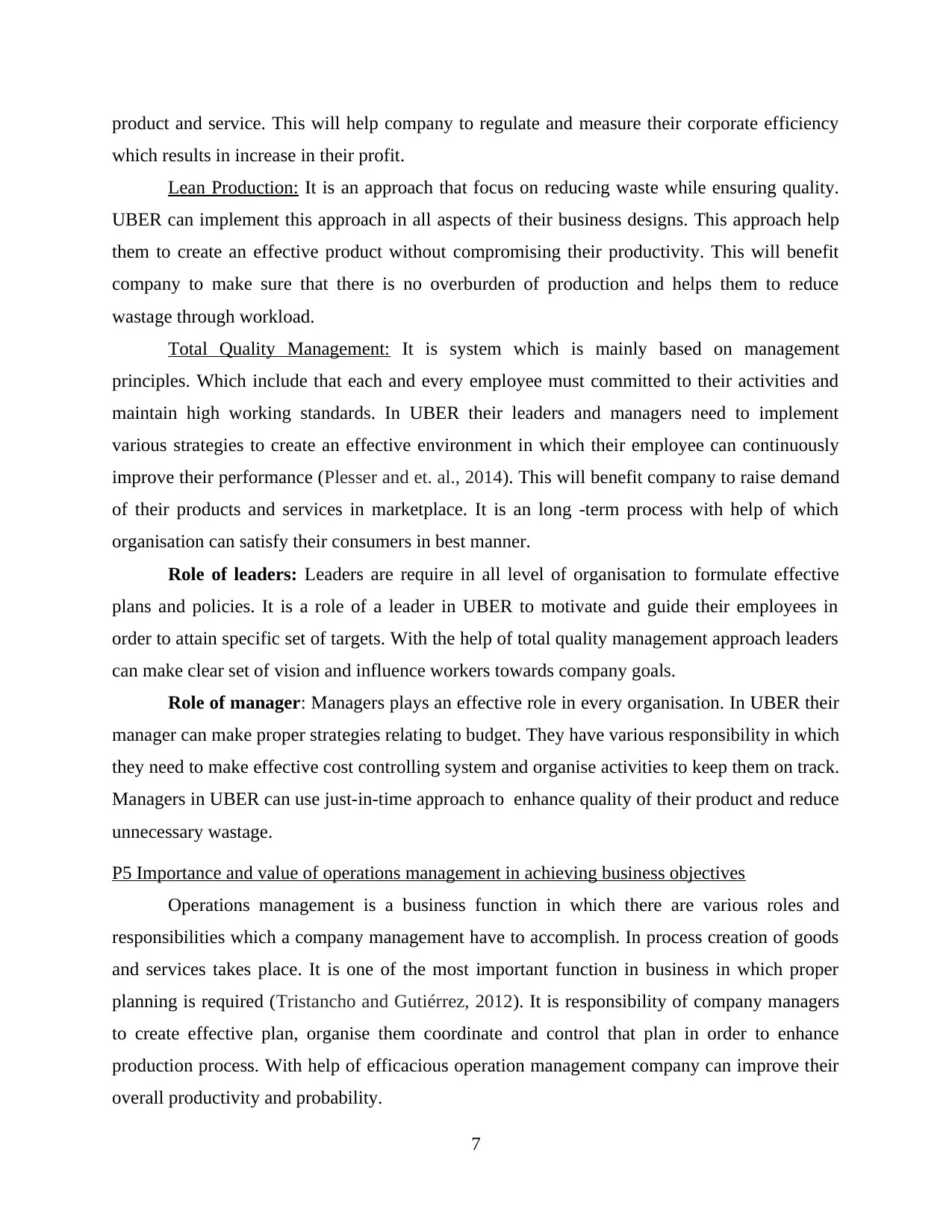
product and service. This will help company to regulate and measure their corporate efficiency
which results in increase in their profit.
Lean Production: It is an approach that focus on reducing waste while ensuring quality.
UBER can implement this approach in all aspects of their business designs. This approach help
them to create an effective product without compromising their productivity. This will benefit
company to make sure that there is no overburden of production and helps them to reduce
wastage through workload.
Total Quality Management: It is system which is mainly based on management
principles. Which include that each and every employee must committed to their activities and
maintain high working standards. In UBER their leaders and managers need to implement
various strategies to create an effective environment in which their employee can continuously
improve their performance (Plesser and et. al., 2014). This will benefit company to raise demand
of their products and services in marketplace. It is an long -term process with help of which
organisation can satisfy their consumers in best manner.
Role of leaders: Leaders are require in all level of organisation to formulate effective
plans and policies. It is a role of a leader in UBER to motivate and guide their employees in
order to attain specific set of targets. With the help of total quality management approach leaders
can make clear set of vision and influence workers towards company goals.
Role of manager: Managers plays an effective role in every organisation. In UBER their
manager can make proper strategies relating to budget. They have various responsibility in which
they need to make effective cost controlling system and organise activities to keep them on track.
Managers in UBER can use just-in-time approach to enhance quality of their product and reduce
unnecessary wastage.
P5 Importance and value of operations management in achieving business objectives
Operations management is a business function in which there are various roles and
responsibilities which a company management have to accomplish. In process creation of goods
and services takes place. It is one of the most important function in business in which proper
planning is required (Tristancho and Gutiérrez, 2012). It is responsibility of company managers
to create effective plan, organise them coordinate and control that plan in order to enhance
production process. With help of efficacious operation management company can improve their
overall productivity and probability.
7
which results in increase in their profit.
Lean Production: It is an approach that focus on reducing waste while ensuring quality.
UBER can implement this approach in all aspects of their business designs. This approach help
them to create an effective product without compromising their productivity. This will benefit
company to make sure that there is no overburden of production and helps them to reduce
wastage through workload.
Total Quality Management: It is system which is mainly based on management
principles. Which include that each and every employee must committed to their activities and
maintain high working standards. In UBER their leaders and managers need to implement
various strategies to create an effective environment in which their employee can continuously
improve their performance (Plesser and et. al., 2014). This will benefit company to raise demand
of their products and services in marketplace. It is an long -term process with help of which
organisation can satisfy their consumers in best manner.
Role of leaders: Leaders are require in all level of organisation to formulate effective
plans and policies. It is a role of a leader in UBER to motivate and guide their employees in
order to attain specific set of targets. With the help of total quality management approach leaders
can make clear set of vision and influence workers towards company goals.
Role of manager: Managers plays an effective role in every organisation. In UBER their
manager can make proper strategies relating to budget. They have various responsibility in which
they need to make effective cost controlling system and organise activities to keep them on track.
Managers in UBER can use just-in-time approach to enhance quality of their product and reduce
unnecessary wastage.
P5 Importance and value of operations management in achieving business objectives
Operations management is a business function in which there are various roles and
responsibilities which a company management have to accomplish. In process creation of goods
and services takes place. It is one of the most important function in business in which proper
planning is required (Tristancho and Gutiérrez, 2012). It is responsibility of company managers
to create effective plan, organise them coordinate and control that plan in order to enhance
production process. With help of efficacious operation management company can improve their
overall productivity and probability.
7
⊘ This is a preview!⊘
Do you want full access?
Subscribe today to unlock all pages.

Trusted by 1+ million students worldwide
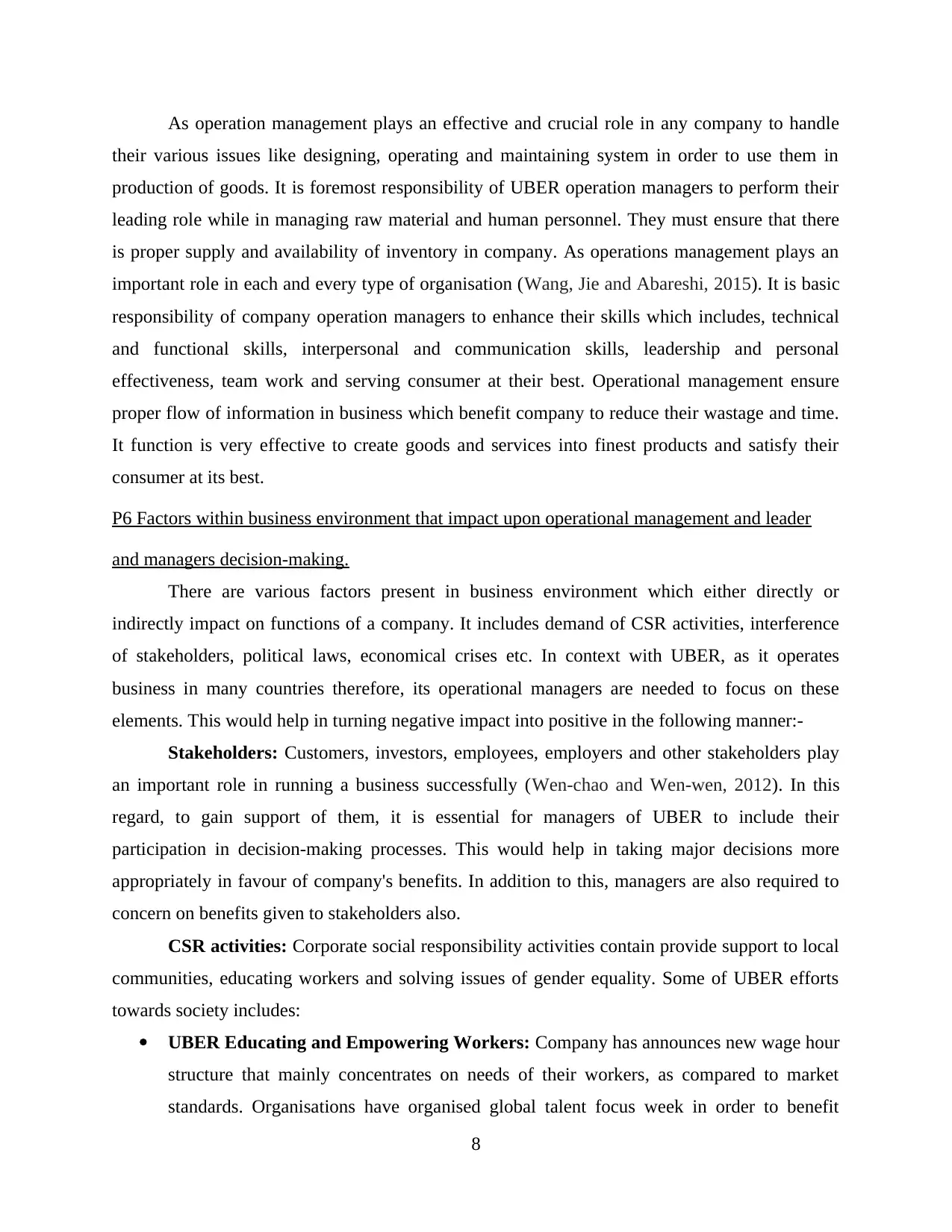
As operation management plays an effective and crucial role in any company to handle
their various issues like designing, operating and maintaining system in order to use them in
production of goods. It is foremost responsibility of UBER operation managers to perform their
leading role while in managing raw material and human personnel. They must ensure that there
is proper supply and availability of inventory in company. As operations management plays an
important role in each and every type of organisation (Wang, Jie and Abareshi, 2015). It is basic
responsibility of company operation managers to enhance their skills which includes, technical
and functional skills, interpersonal and communication skills, leadership and personal
effectiveness, team work and serving consumer at their best. Operational management ensure
proper flow of information in business which benefit company to reduce their wastage and time.
It function is very effective to create goods and services into finest products and satisfy their
consumer at its best.
P6 Factors within business environment that impact upon operational management and leader
and managers decision-making.
There are various factors present in business environment which either directly or
indirectly impact on functions of a company. It includes demand of CSR activities, interference
of stakeholders, political laws, economical crises etc. In context with UBER, as it operates
business in many countries therefore, its operational managers are needed to focus on these
elements. This would help in turning negative impact into positive in the following manner:-
Stakeholders: Customers, investors, employees, employers and other stakeholders play
an important role in running a business successfully (Wen-chao and Wen-wen, 2012). In this
regard, to gain support of them, it is essential for managers of UBER to include their
participation in decision-making processes. This would help in taking major decisions more
appropriately in favour of company's benefits. In addition to this, managers are also required to
concern on benefits given to stakeholders also.
CSR activities: Corporate social responsibility activities contain provide support to local
communities, educating workers and solving issues of gender equality. Some of UBER efforts
towards society includes:
UBER Educating and Empowering Workers: Company has announces new wage hour
structure that mainly concentrates on needs of their workers, as compared to market
standards. Organisations have organised global talent focus week in order to benefit
8
their various issues like designing, operating and maintaining system in order to use them in
production of goods. It is foremost responsibility of UBER operation managers to perform their
leading role while in managing raw material and human personnel. They must ensure that there
is proper supply and availability of inventory in company. As operations management plays an
important role in each and every type of organisation (Wang, Jie and Abareshi, 2015). It is basic
responsibility of company operation managers to enhance their skills which includes, technical
and functional skills, interpersonal and communication skills, leadership and personal
effectiveness, team work and serving consumer at their best. Operational management ensure
proper flow of information in business which benefit company to reduce their wastage and time.
It function is very effective to create goods and services into finest products and satisfy their
consumer at its best.
P6 Factors within business environment that impact upon operational management and leader
and managers decision-making.
There are various factors present in business environment which either directly or
indirectly impact on functions of a company. It includes demand of CSR activities, interference
of stakeholders, political laws, economical crises etc. In context with UBER, as it operates
business in many countries therefore, its operational managers are needed to focus on these
elements. This would help in turning negative impact into positive in the following manner:-
Stakeholders: Customers, investors, employees, employers and other stakeholders play
an important role in running a business successfully (Wen-chao and Wen-wen, 2012). In this
regard, to gain support of them, it is essential for managers of UBER to include their
participation in decision-making processes. This would help in taking major decisions more
appropriately in favour of company's benefits. In addition to this, managers are also required to
concern on benefits given to stakeholders also.
CSR activities: Corporate social responsibility activities contain provide support to local
communities, educating workers and solving issues of gender equality. Some of UBER efforts
towards society includes:
UBER Educating and Empowering Workers: Company has announces new wage hour
structure that mainly concentrates on needs of their workers, as compared to market
standards. Organisations have organised global talent focus week in order to benefit
8
Paraphrase This Document
Need a fresh take? Get an instant paraphrase of this document with our AI Paraphraser
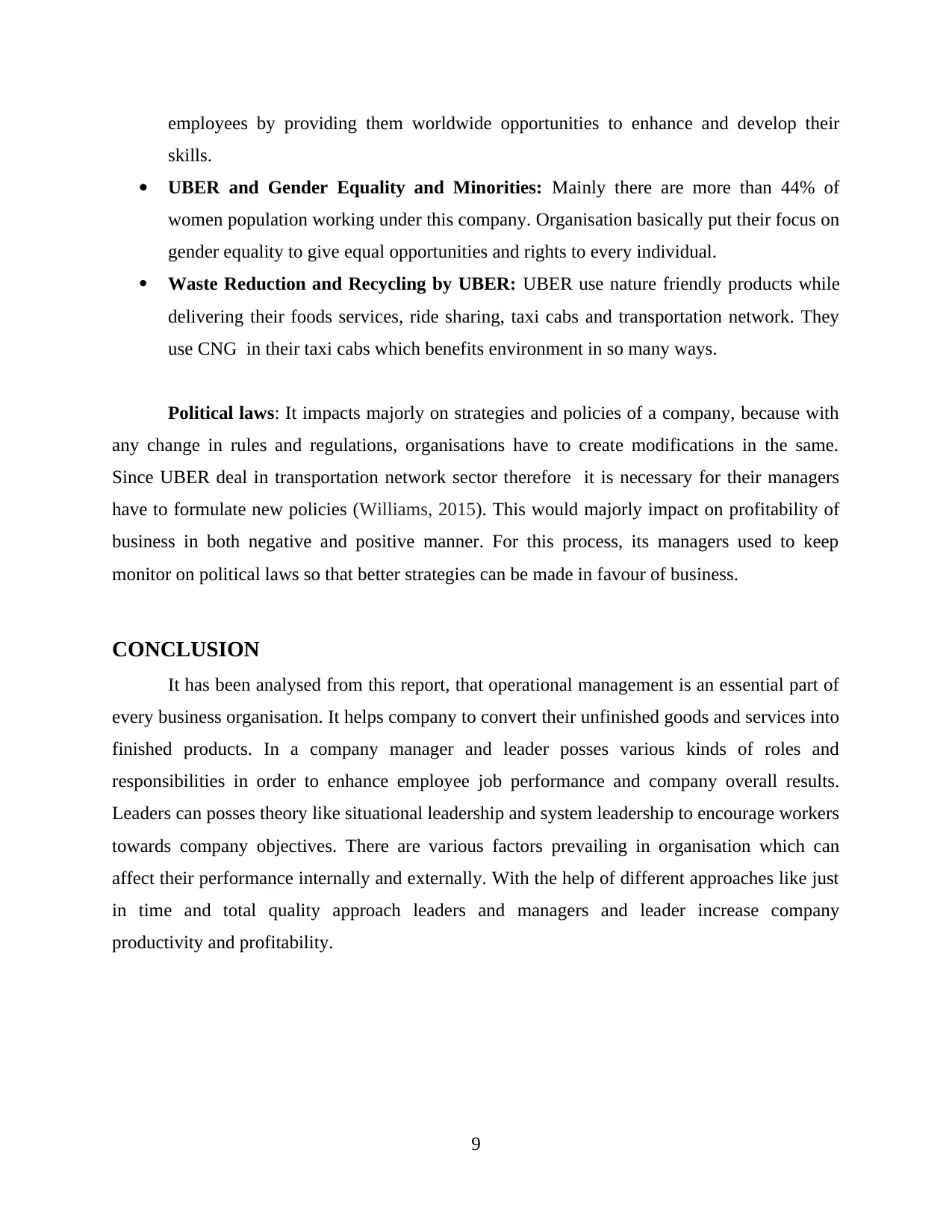
employees by providing them worldwide opportunities to enhance and develop their
skills.
UBER and Gender Equality and Minorities: Mainly there are more than 44% of
women population working under this company. Organisation basically put their focus on
gender equality to give equal opportunities and rights to every individual.
Waste Reduction and Recycling by UBER: UBER use nature friendly products while
delivering their foods services, ride sharing, taxi cabs and transportation network. They
use CNG in their taxi cabs which benefits environment in so many ways.
Political laws: It impacts majorly on strategies and policies of a company, because with
any change in rules and regulations, organisations have to create modifications in the same.
Since UBER deal in transportation network sector therefore it is necessary for their managers
have to formulate new policies (Williams, 2015). This would majorly impact on profitability of
business in both negative and positive manner. For this process, its managers used to keep
monitor on political laws so that better strategies can be made in favour of business.
CONCLUSION
It has been analysed from this report, that operational management is an essential part of
every business organisation. It helps company to convert their unfinished goods and services into
finished products. In a company manager and leader posses various kinds of roles and
responsibilities in order to enhance employee job performance and company overall results.
Leaders can posses theory like situational leadership and system leadership to encourage workers
towards company objectives. There are various factors prevailing in organisation which can
affect their performance internally and externally. With the help of different approaches like just
in time and total quality approach leaders and managers and leader increase company
productivity and profitability.
9
skills.
UBER and Gender Equality and Minorities: Mainly there are more than 44% of
women population working under this company. Organisation basically put their focus on
gender equality to give equal opportunities and rights to every individual.
Waste Reduction and Recycling by UBER: UBER use nature friendly products while
delivering their foods services, ride sharing, taxi cabs and transportation network. They
use CNG in their taxi cabs which benefits environment in so many ways.
Political laws: It impacts majorly on strategies and policies of a company, because with
any change in rules and regulations, organisations have to create modifications in the same.
Since UBER deal in transportation network sector therefore it is necessary for their managers
have to formulate new policies (Williams, 2015). This would majorly impact on profitability of
business in both negative and positive manner. For this process, its managers used to keep
monitor on political laws so that better strategies can be made in favour of business.
CONCLUSION
It has been analysed from this report, that operational management is an essential part of
every business organisation. It helps company to convert their unfinished goods and services into
finished products. In a company manager and leader posses various kinds of roles and
responsibilities in order to enhance employee job performance and company overall results.
Leaders can posses theory like situational leadership and system leadership to encourage workers
towards company objectives. There are various factors prevailing in organisation which can
affect their performance internally and externally. With the help of different approaches like just
in time and total quality approach leaders and managers and leader increase company
productivity and profitability.
9
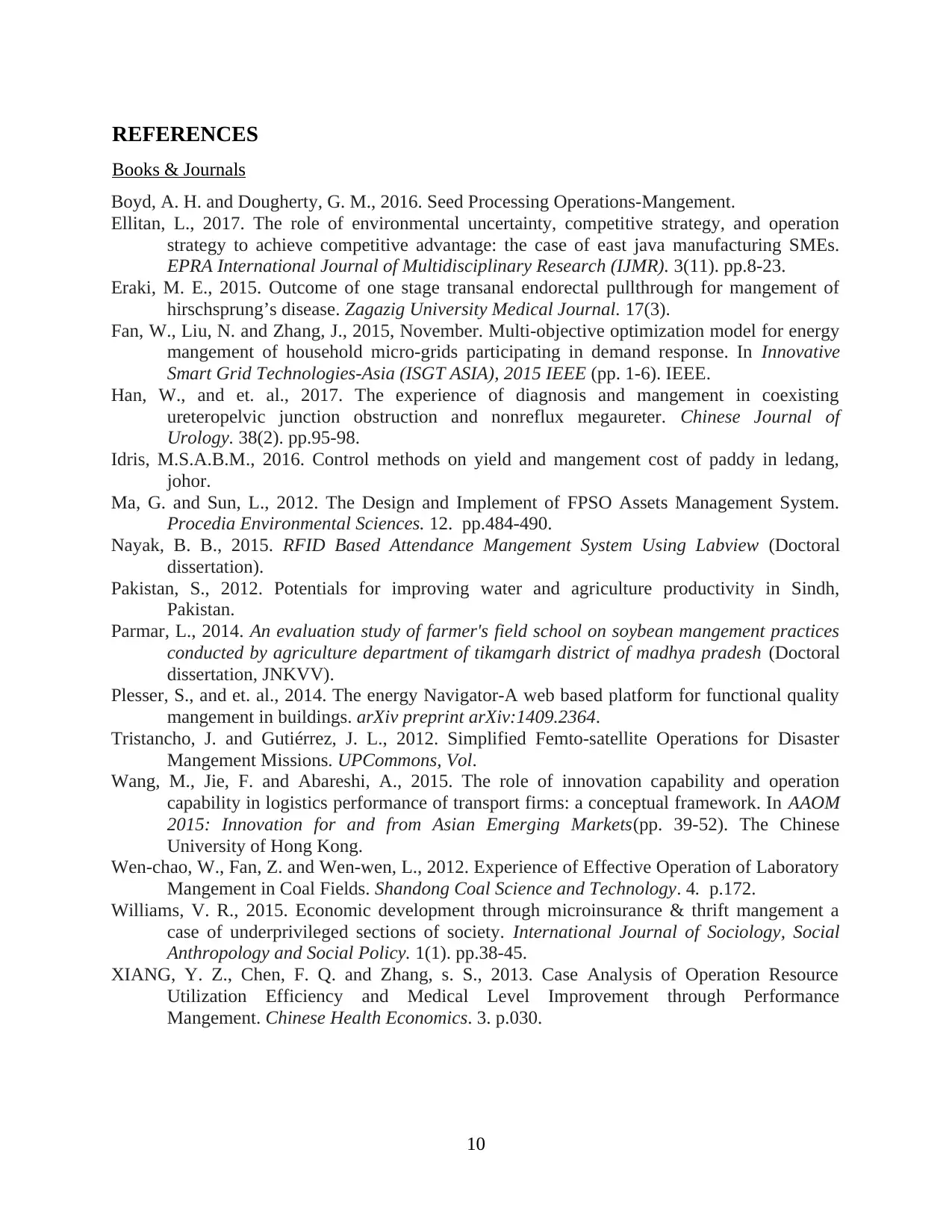
REFERENCES
Books & Journals
Boyd, A. H. and Dougherty, G. M., 2016. Seed Processing Operations-Mangement.
Ellitan, L., 2017. The role of environmental uncertainty, competitive strategy, and operation
strategy to achieve competitive advantage: the case of east java manufacturing SMEs.
EPRA International Journal of Multidisciplinary Research (IJMR). 3(11). pp.8-23.
Eraki, M. E., 2015. Outcome of one stage transanal endorectal pullthrough for mangement of
hirschsprung’s disease. Zagazig University Medical Journal. 17(3).
Fan, W., Liu, N. and Zhang, J., 2015, November. Multi-objective optimization model for energy
mangement of household micro-grids participating in demand response. In Innovative
Smart Grid Technologies-Asia (ISGT ASIA), 2015 IEEE (pp. 1-6). IEEE.
Han, W., and et. al., 2017. The experience of diagnosis and mangement in coexisting
ureteropelvic junction obstruction and nonreflux megaureter. Chinese Journal of
Urology. 38(2). pp.95-98.
Idris, M.S.A.B.M., 2016. Control methods on yield and mangement cost of paddy in ledang,
johor.
Ma, G. and Sun, L., 2012. The Design and Implement of FPSO Assets Management System.
Procedia Environmental Sciences. 12. pp.484-490.
Nayak, B. B., 2015. RFID Based Attendance Mangement System Using Labview (Doctoral
dissertation).
Pakistan, S., 2012. Potentials for improving water and agriculture productivity in Sindh,
Pakistan.
Parmar, L., 2014. An evaluation study of farmer's field school on soybean mangement practices
conducted by agriculture department of tikamgarh district of madhya pradesh (Doctoral
dissertation, JNKVV).
Plesser, S., and et. al., 2014. The energy Navigator-A web based platform for functional quality
mangement in buildings. arXiv preprint arXiv:1409.2364.
Tristancho, J. and Gutiérrez, J. L., 2012. Simplified Femto-satellite Operations for Disaster
Mangement Missions. UPCommons, Vol.
Wang, M., Jie, F. and Abareshi, A., 2015. The role of innovation capability and operation
capability in logistics performance of transport firms: a conceptual framework. In AAOM
2015: Innovation for and from Asian Emerging Markets(pp. 39-52). The Chinese
University of Hong Kong.
Wen-chao, W., Fan, Z. and Wen-wen, L., 2012. Experience of Effective Operation of Laboratory
Mangement in Coal Fields. Shandong Coal Science and Technology. 4. p.172.
Williams, V. R., 2015. Economic development through microinsurance & thrift mangement a
case of underprivileged sections of society. International Journal of Sociology, Social
Anthropology and Social Policy. 1(1). pp.38-45.
XIANG, Y. Z., Chen, F. Q. and Zhang, s. S., 2013. Case Analysis of Operation Resource
Utilization Efficiency and Medical Level Improvement through Performance
Mangement. Chinese Health Economics. 3. p.030.
10
Books & Journals
Boyd, A. H. and Dougherty, G. M., 2016. Seed Processing Operations-Mangement.
Ellitan, L., 2017. The role of environmental uncertainty, competitive strategy, and operation
strategy to achieve competitive advantage: the case of east java manufacturing SMEs.
EPRA International Journal of Multidisciplinary Research (IJMR). 3(11). pp.8-23.
Eraki, M. E., 2015. Outcome of one stage transanal endorectal pullthrough for mangement of
hirschsprung’s disease. Zagazig University Medical Journal. 17(3).
Fan, W., Liu, N. and Zhang, J., 2015, November. Multi-objective optimization model for energy
mangement of household micro-grids participating in demand response. In Innovative
Smart Grid Technologies-Asia (ISGT ASIA), 2015 IEEE (pp. 1-6). IEEE.
Han, W., and et. al., 2017. The experience of diagnosis and mangement in coexisting
ureteropelvic junction obstruction and nonreflux megaureter. Chinese Journal of
Urology. 38(2). pp.95-98.
Idris, M.S.A.B.M., 2016. Control methods on yield and mangement cost of paddy in ledang,
johor.
Ma, G. and Sun, L., 2012. The Design and Implement of FPSO Assets Management System.
Procedia Environmental Sciences. 12. pp.484-490.
Nayak, B. B., 2015. RFID Based Attendance Mangement System Using Labview (Doctoral
dissertation).
Pakistan, S., 2012. Potentials for improving water and agriculture productivity in Sindh,
Pakistan.
Parmar, L., 2014. An evaluation study of farmer's field school on soybean mangement practices
conducted by agriculture department of tikamgarh district of madhya pradesh (Doctoral
dissertation, JNKVV).
Plesser, S., and et. al., 2014. The energy Navigator-A web based platform for functional quality
mangement in buildings. arXiv preprint arXiv:1409.2364.
Tristancho, J. and Gutiérrez, J. L., 2012. Simplified Femto-satellite Operations for Disaster
Mangement Missions. UPCommons, Vol.
Wang, M., Jie, F. and Abareshi, A., 2015. The role of innovation capability and operation
capability in logistics performance of transport firms: a conceptual framework. In AAOM
2015: Innovation for and from Asian Emerging Markets(pp. 39-52). The Chinese
University of Hong Kong.
Wen-chao, W., Fan, Z. and Wen-wen, L., 2012. Experience of Effective Operation of Laboratory
Mangement in Coal Fields. Shandong Coal Science and Technology. 4. p.172.
Williams, V. R., 2015. Economic development through microinsurance & thrift mangement a
case of underprivileged sections of society. International Journal of Sociology, Social
Anthropology and Social Policy. 1(1). pp.38-45.
XIANG, Y. Z., Chen, F. Q. and Zhang, s. S., 2013. Case Analysis of Operation Resource
Utilization Efficiency and Medical Level Improvement through Performance
Mangement. Chinese Health Economics. 3. p.030.
10
⊘ This is a preview!⊘
Do you want full access?
Subscribe today to unlock all pages.

Trusted by 1+ million students worldwide
1 out of 12
Related Documents
Your All-in-One AI-Powered Toolkit for Academic Success.
+13062052269
info@desklib.com
Available 24*7 on WhatsApp / Email
![[object Object]](/_next/static/media/star-bottom.7253800d.svg)
Unlock your academic potential
Copyright © 2020–2025 A2Z Services. All Rights Reserved. Developed and managed by ZUCOL.





